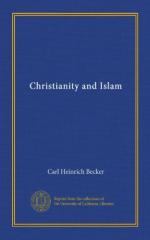A similar attitude was also assumed by either religion towards the facts of economic life. In either case the religious point of view is characteristic. The reaction against the tendency to condemn secular life is certainly stronger in Islam, but is also apparent in Christianity. Thomas Aquinas directly stigmatises trade as a disgraceful means of gain, because the exchange of wares does not necessitate labour or the satisfaction of necessary wants: Muhammedan tradition says, “The pious merchant is a pioneer on the road of God.” “The first to enter Paradise is the honourable merchant.” Here the solution given to the problem differs in either case, but in Christian practice, opposition was also obvious. Common to both religions is the condemnation of the exaction of interest and monetary speculation, which the middle ages regarded as usury. Islam, as usual, gives this Christian idea the form of a saying enounced by Muhammed: “He who speculates in grain for forty days, grinds and bakes it and gives it to the poor, makes an offering unacceptable to God.” “He who raises prices to Muslims (by speculation) will be cast head downwards by God into the hottest fire of hell.” Many similar traditions fulminate against usury in the widest sense of the word. These prohibitions were circumvented in practice by deed of gift and exchange, but none the less the free development of commercial enterprise was hampered by these fetters which modern civilisation first broke. Enterprise was thus confined to agriculture under these circumstances both for Christianity and Islam, and economic life in either case became “mediaeval” in outward appearance.
Methods of making profit without a proportional expenditure of labour were the particular objects of this aversion. Manual labour was highly esteemed both in the East and West. A man’s first duty was to support himself by the work of his own hands, a duty proclaimed, as we know, from the apostolic age onwards. So far as Islam is concerned, this view may be illustrated by the following utterances: “The best of deeds is the gain of that which is lawful”: “the best gain is made by sale within lawful limits and by manual labour.” “The most precious gain is that made by manual labour; that which a man thus earns and gives to himself, his people, his sons and his servants, is as meritorious as alms.” Thus practical work is made incumbent upon the believer, and the extent to which manufacture flourished in East and West during the middle ages is well known.




